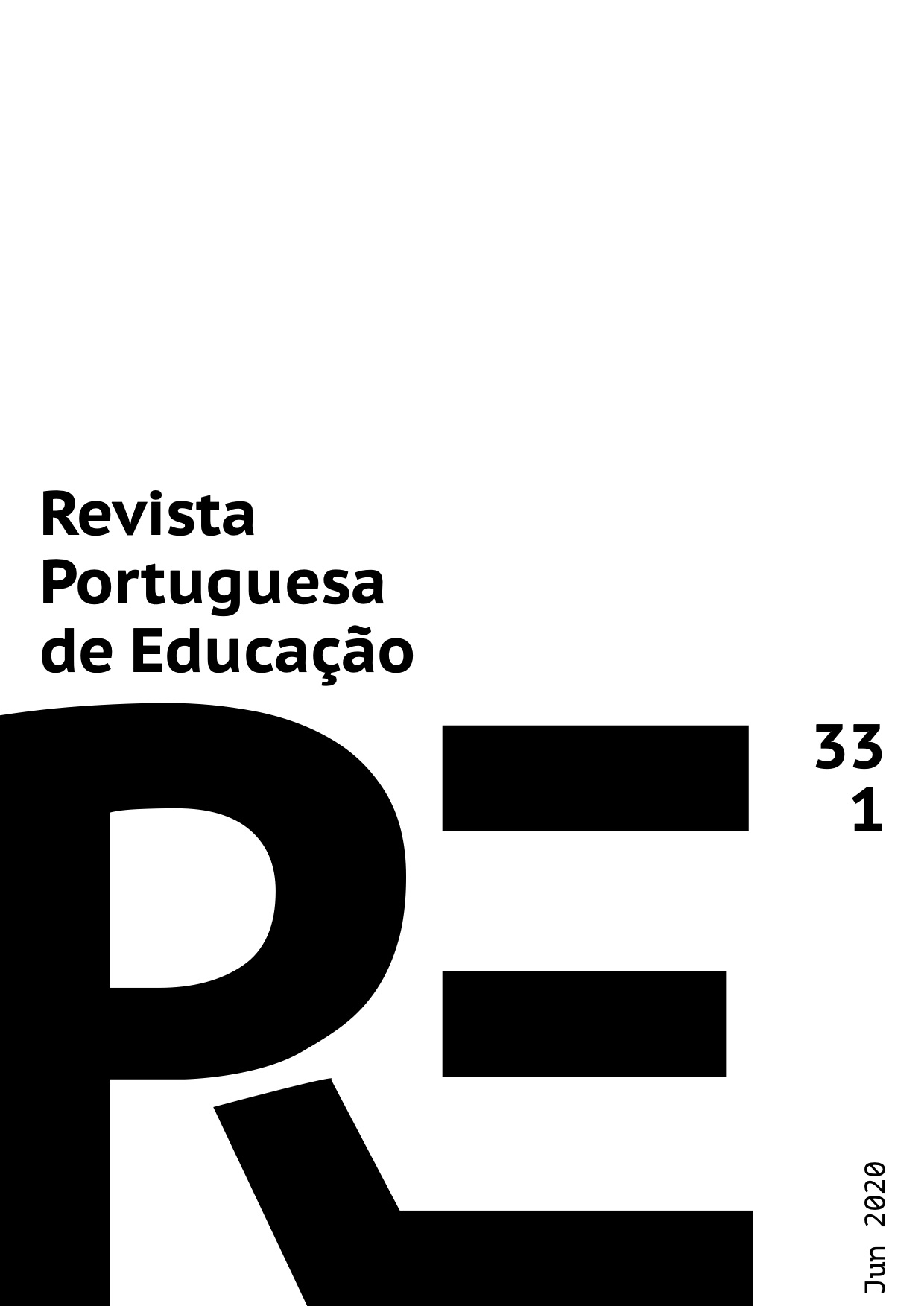Escala de avaliação das estratégias de aprendizagem (ensino profissionalizante): Adaptação e estudos psicométricos
Learning strategies assessment scale for vocational education: Adaptation and psychometric studies
DOI:
https://doi.org/10.21814/rpe.19127Keywords:
Estratégias cognitivas, Estratégias metacognitivas, Avaliação psicoeducacionalAbstract
This study aimed to investigate the psychometric properties of the Learning Strategies Assessment Scale for students in Vocational Education (EAVAP-EP). We adapted this scale from Middle School to vocational education through a focal study with five teachers and 11 students. Through the expert judge's analysis and a pilot study with 24 students that evaluated the representativeness and comprehension of the adapted items of EAVAP-EP, we obtained the content validity of the EAVAP-EP. Afterwards, 401 students participated in the search for validity evidence based on EAVAP-EP internal structure. Principal component analysis indicated the explained variance of 31.37% of the instrument. EAVAP-EP presented 28 items divided into three dimensions: cognitive, metacognitive, and dysfunctional metacognitive. Factor loadings were above 0.30. The EAVAP-EP reliability estimate was also verified (total scale: α = 0.86). We suggest the use of EAVAP-EP in the context of vocational education and the continuity of research with the instrument.
Downloads
References
Borsa, J. C., & Seize, M. M. (2017). Construção e adaptação de instrumentos psicológicos: Dois caminhos possíveis. Em B. F. Damásio, & J. C. Borsa (Orgs.). Manual de desenvolvimento de instrumentos psicológicos, (pp. 15-38). São Paulo: Vetor.
Boruchovitch, E. (1999). Estratégias de aprendizagem e desempenho escolar: considerações para a prática educacional. Psicologia Reflexão e Crítica, 12(2), 361-376.
Brasil, Ministério da Educação. (2018). Educação Profissional Técnica de Nível Médio - Saiba Mais. Recuperado de encurtador.com.br/ksQV0
Brasil, Ministério da Educação. (2012). Resolução Nº 6, de 20 de setembro de 2012. Recuperado de encurtador.com.br/CMNX7
Brasil, Conselho Nacional de Saúde. (2016). Resolução CNS 510, de 07 de abril de 2016. Recuperado de http://conselho.saude.gov.br/resolucoes/2016/Reso510.pdf
Cash, R. M. (2016). Self-regulation in the Classroom: Helping students learn how to learn. Free Spirit Publishing Inc.: Golden Valley, MN.
Costa, E. R. D., & Boruchovitch, E. (2015). O ensino de estratégias de aprendizagem no contexto da escrita. Psicologia da Educação, (41), 21-35. doi: 10.5935/2175-3520.20150012
Cruvinel, M. & Boruchovitch, E. (2004). Sintomas depressivos, estratégias de aprendizagem e rendimento escolar de alunos do ensino fundamental. Psicologia em Estudo, 9 (3), 369-378.
Dembo, M. H., & Eaton, M. J. (2000). Self-regulation of academic learning in middle-level schools. The Elementary School Journal, 100(5), 473-490. doi: 10.1086/499651
Flavell, J. H. (1979). Metacognition e Cognitive Monitoring: A new area of cognitive- developmental inquiry. American Psychologist, 34(10), 906-911.
Ganda, D. R., & Boruchovitch, E., (2016). As atribuições de causalidade e as estratégias autoprejudiciais de alunos do curso de pedagogia. Psico-USF, 21(2), 331-340. doi: 10.1590/1413-82712016210210
Gomes, M. A. M., & Boruchovitch, E. (2005). Desempenho no jogo, estratégias de aprendizagem e compreensão na leitura. Psicologia: Teoria e Pesquisa, 21(3), 319-326.
Kikas, E., & Jõgi, A. (2015). Assessment of learning strategies: self-report questionnaire of learning task. European Journal Psychology of Education, 31(4), 579-593, doi: 10.1007/s10212-015-0276-3
Liu, O. L. (2009). Evaluation of a learning strategies scale for middle school students. Journal of Psychoeducational Assesment, 27(4), 1-11. doi: 10.1177/0734282908327935
Murphy, K. R., & Davidshofer, C. O. (1988). Psychological testing: Principles and applications. Englewood Cliffs, New Jersey: Prentice Hall.
Oliveira, K. L., Boruchovitch, E., & Santos, A. A. A. (2010). EAVAP-EF – Escala de avaliação das estratégias de aprendizagem para o ensino fundamental. São Paulo: Casa do Psicólogo.
Oliveira, K. L., Boruchovitch, E., & Santos, A. A. A. (2011). Estratégias de aprendizagem no ensino fundamental: Análise por gênero, série escolar e idade. Psico, 42(1), 98-105.
Oliveira, K. L., Santos, A. A. A., & Inácio, A. L. M. (2017). Estratégias de aprendizagem no ensino médio brasileiro: análise exploratória dos resultados. Revista de Estudios e Investigacíon en Psicología y Educación, v/e(1), 338-341. doi: 10.17979/reipe.2017.0.01.3041
Pasquali, L. (1999). Psicometria - Teoria dos Testes na psicologia e na educação. São Paulo: Vozes.
Pereira, P. S. P., & Santos, A. A. A. (2016). Escala de Avaliação de Estratégias de Aprendizagem para o Ensino Profissionalizante (EAVAP-EP). (Manuscrito não publicado). Universidade São Francisco, Itatiba, São Paulo.
Pereira, P. S. P. (2016). Parâmetros psicométricos de uma Escala de Avaliação de Estratégias de Aprendizagem para o Ensino Profissionalizante. (Dissertação de Mestrado). Universidade São Francisco, Itatiba, São Paulo.
Pozo, J. I. (1996) Estratégias de Aprendizagem. In C. Coll., J. Palacios & A. Marchesi. Desenvolvimento Psicológico e Educação - Psicologia da Educação, (pp. 122-137). Porto Alegre: Artes Médicas.
Santos, D. A., & Alliprandini, P. M. Z. (2017). Efeito de uma intervenção em estratégias de aprendizagem por infusão em alunos de biologia do Ensino Médio. Revista de Educación en Biología, 20(2), 52-72.
Scacchetti, F. A. P., Oliveira, K. L. D., & Moreira, A. E. D. C. (2015). Estratégias de Aprendizagem no Ensino Técnico Profissional. Psico-USF, 20(3), 433-446.
Slaats, S. A., Lodewijks, H. G. L. C. & Van der Saden, J. M. M. (1999). Learning styles in secondary vocational education: Disciplinary differences. Learning Instruction, 9(5), 475-492. doi: 10.1016/S0959-4752(99)00007-9
Downloads
Published
How to Cite
Issue
Section
License
1. The authors preserve their authorship and grant the Portuguese Journal of Education the right to the first publication. The work is licensed under Creative Commons Attribution License that allows sharing the work with the acknowledgment of initial authorship and publication in this Journal.
2. The authors have the right to take additional contracts separately, for non-exclusive distribution of the published version of their work (e.g. to deposit in an institutional repository or as a book chapter), acknowledging the initial authorship and publication in this Journal.
3. The authors have the permission and are stimulated to post their work online (e.g. in an institutional repository or on their personal website). They can do this at any phase of the editorial process, as it may generate productive changes, as well as increase impact and article citation (see The Open Citation Project).
The work is licensed under Attribution-ShareAlike 4.0 International (CC BY-SA 4.0)




















